Rise of the bodyguard
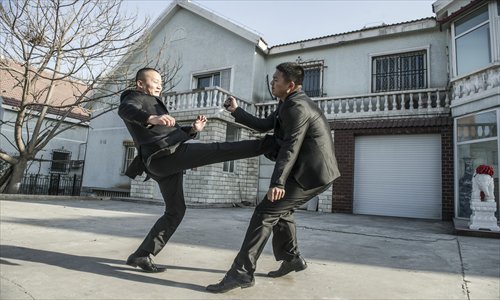
Shi Xingfeng demonstrates how to disarm an attacker with speed and power.Photo: Li Hao/GT
Sherry, 28, looks as threatening as a baby panda. The only hint of her occupation is her athletic build and her military-style shirt.
She is a bodyguard. And since she is now on a mission, according to her confidentiality agreement, she could only give her English name, and couldn't be photographed. Sherry's identity is only known to her client and her client's family. The rest of the company thinks their boss has simply hired another assistant.
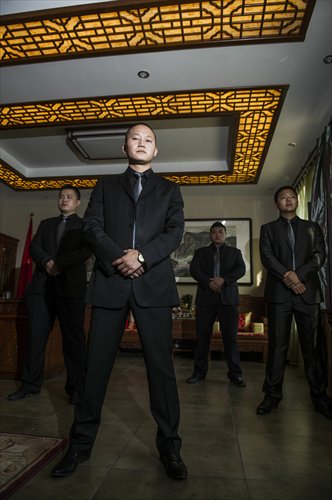
Bodyguards, once the purview of Hong Kong action movies, are becoming a high-paying new job in modern China. Photo: Li Hao/GT
As one of the few female bodyguards in this city, Sherry thinks being a woman has its advantages in this line of work. "Most female clients like to hire a woman. And female bodyguards are more elusive - if you're not told, you'd never know that I am actually a bodyguard," she said. "The most interesting part about my job is that I can learn things from all those different successful people. And I think my job is very thrilling."
Many young men and women in Beijing have chosen to be a bodyguard, which is still a rare profession in China. Companies that provide bodyguard services and bodyguard training are prospering.
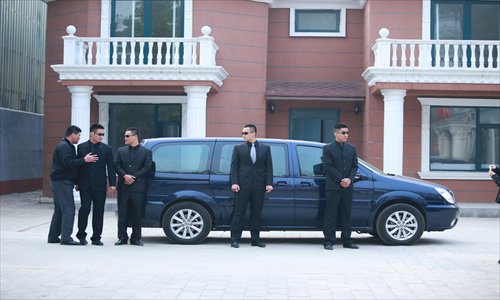
An intimidating appearance can make troublemakers think twice. Photo: Courtesy of Pan Xianjin
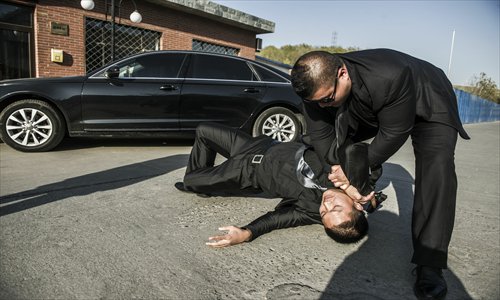
Subduing an attacker armed with a gun. Photo: Li Hao/GT
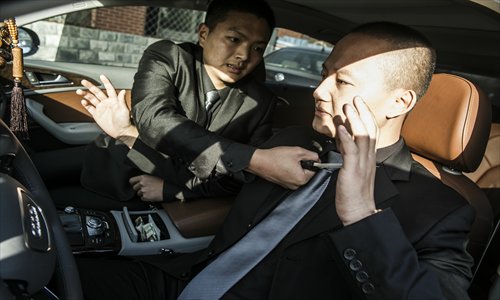
An instructor teaches bodyguards how to deal with a knife attack. Photo: Li Hao/GT
An exciting job
Originally from Inner Mongolia Autonomous Region, Sherry has been into wushu (martial arts) since she was a little girl, and she went to wushu schools to get trained.
In 2011 she received professional bodyguard training at the Bojing Security Agency in Beijing. After her three months' training at the company in 2011, Sherry has a new understanding about being a bodyguard. "I used to think I can fight and that's the most important thing," she said. "I used to think bodyguards should put on airs to scare people, but my coaches told me to be an 'invisible' guard, to protect the clients."
The most dangerous occasion that Sherry has met was when her client was almost kidnapped by his business partner, who had taken issue with profit distribution. The security team was off duty because the client insisted on having a family dinner without protection. The kidnappers blocked phone signals around the hotel and waited at every exit with anesthetic needles. Sherry and her partners had to rappel the client and his family down from the ninth floor with ropes, and avoided a head-on confrontation.
"That case taught us that in the end, we are professionals and can assess dangers better, so our clients should listen to us on these matters," said Sherry, who added that her team should never have left the client. "Avoiding danger is our job," said Sherry, who seldom has to use fists in her work.
"I will retire at 35 and then I'll think about having a relationship," said Sherry. Although it's not compulsory, it's still an unwritten rule for the guards not to date. "Girls are more emotional, and a relationship might influence our judgment at work."
Sherry's colleague surnamed Cui told Metropolitan about his mission in Angola protecting an entrepreneur. "Once I had to confront two guards holding AK47s," said Cui. "We were very confident with our combat skills, even when facing foreigners who are bigger than us."
More than just muscle
It took Cui, who entered the business in 2009, a long time to gain the support of his own family, who opposed the new job at first. "There's a misunderstanding. Influenced by TV shows, many people think bodyguards are thugs, and fight when the client gives a command," said Cui.
"Actually our best team member is only 170 centimeters tall, but he's great in speed and power. We call him Leopard," said Sherry. "Some clients like strong, tall muscleman, but others may attach more importance to one's capability, sense of responsibility and professionalism."
Sherry and Cui also had courses on the law, special driving, etiquette and secretarial work.
"We want our students to be gentleman bodyguards," said Shi Xingfeng, 30, CEO of Bojing Security Agency. "If they can only fight, they are not a qualified modern bodyguard."
"I think we should make the bodyguards invisible. Don't blow up their identities in advance. They should wear normal clothes instead of black suits and appear as an assistant or secretary," said Shi.
However, Mou Xiaolong runs his business in a different style. Mou is the founder of Dragon International Bodyguard, registered in Hong Kong, with its training base in Zhangjiakou, Hebei Province. Mou, who used to be a military policeman and has protected important politicians, requires his team members to be at least 180 centimeters tall and weigh at least 85 kilograms. "The supreme art of war is to subdue the enemy without fighting, and you need an intimidating appearance," Mou said.
Chinese-style
After eight years spent in the Shaolin Temple in Henan Province practicing kung fu, Shi came to Beijing in 2004, with a dream of starting his own business. But he was at a loss about what to do. From 2006 to 2008, he went abroad to do kung fu performances, where he got many invitations from foreign entrepreneurs to be their bodyguard. Then Shi did some market research and decided opening a bodyguard company in China would be promising.
"[Western security firms] are good at firearms and we are good at kung fu," said Shi. "We are as good as the caravan guards from ancient China that you read about in novels," added Mou, proudly.
In the West, bodyguards in their 50s are still highly sought after because they are experienced and can use guns. But in China, combat skills and one's wisdom are more important, said Shi. Shi only accepts students between 18 and 35.
Training overseas usually focuses on anti-terrorism and armed protection. But in China the training is more about defending and controlling an attacker, said Shi.
Pan Xianjin founded Kingdom Bodyguard in 2011, with a training base also in Zhangjiakou, and another in Xi'an, Shaanxi Province. Pan entered the business in 2000, and has spent about half of his time protecting Chinese entrepreneurs abroad, in Dubai, Kuwait, Libya, Mauritius and other places. Overseas assignments account for the majority of Pan's business.
"I think many international bodyguard companies have tried to enter China's market, but other countries' models are not suitable here," said Pan. Pan thinks that since guns are not allowed in China, domestic training should focus more on risk assessment and avoidance, as well as close combat.
Another difference lies in the clients, said Shi. Western clients always listen to bodyguards, said Shi. "But Chinese entrepreneurs tend to think they are also security experts. Sometimes they question our plans and routes."
A promising industry
China has become a country with a fast-growing number of rich people. According to the 2013 Forbes China Rich List, there are 168 billionaires, surpassing 113 from last year.
Behind the growing fortune lies a complicated sense of insecurity. Zong Qinghou, chairman of China's beverage giant Hangzhou Wahaha Group Co., Ltd, was attacked by a knifeman on September 13 near his residence, the Global Times reported. "That incident was a wakeup call for our entrepreneurs, I think," said Shi. About 80 percent of Shi's business is from local entrepreneurs.
"Many rich people think it'll be fine if they stay low-key. But that's wrong, because many assaults come from people who are familiar with them, like family or employees," said Shi. "But in recent years, I can see entrepreneurs are gradually realizing the importance of security services."
Mou estimated that there are about 40 or 50 bodyguard companies in the country. A new guard usually can expect a monthly salary of 7,000 yuan ($1,150), said Mou. The average bodyguard makes about 35,000 yuan a month in Beijing, said Shi.
As for profits from running a bodyguard company, Mou said, "Profits accrued from one bodyguard can equal the salary of 100 security guards." At Mou's training center, a three-month training session costs 15,000 yuan, accommodation and equipment included.
Most of Shi's students are former armed police, special force soldiers and wushu champions. "Actually it's also a good way to solve the problem of the employment of retired soldiers and police officers," said Shi.
With the industry flourishing, however, the profession is still in a legal gray area.
The existence of bodyguards was unregulated until 2010 when the management regulations for security services released by the State Council stated that security guards are allowed to provide personal protection. In the industry, this regulation is considered a signal of the legalization of the profession.
Since no actual laws cover the profession, bodyguards can only do justifiable self-defense. "Related laws and regulations are needed to rectify and standardize this industry," said Shi.